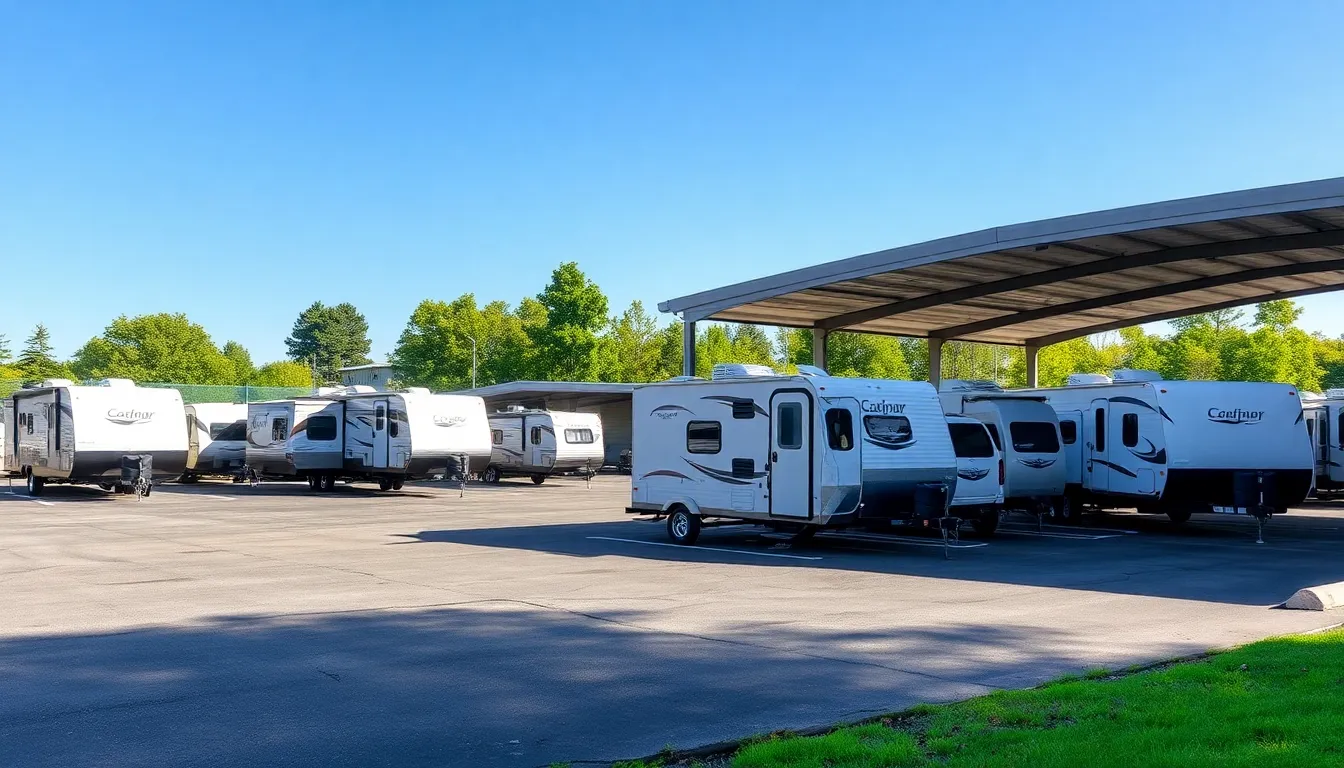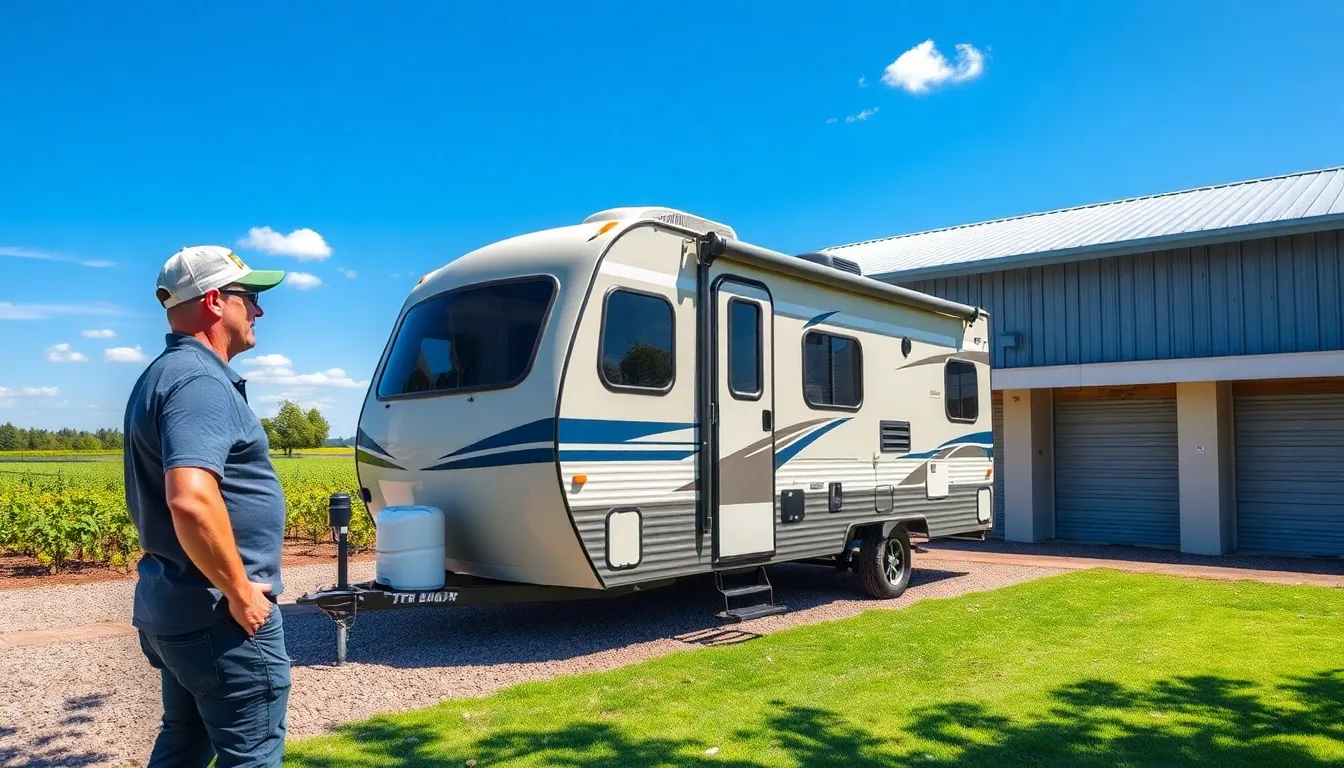Travel trailers are the ultimate ticket to adventure, but what happens when the road trip ends and it’s time to park your rolling home? Finding the right storage solution can feel like searching for a needle in a haystack—except the needle is your beloved trailer and the haystack is a mountain of options. Fear not! With the right tips and tricks, storing your travel trailer can be as easy as pie (or at least easier than folding a fitted sheet).
Travel Trailer Storage
Travel trailer storage demands attention to safeguard the vehicle and extend its life. Proper practices in storage can prevent damage and maintain quality.
Importance of Proper Storage
Proper storage protects against environmental damage. Sun exposure can fade paint and deteriorate plastics over time. Humidity encourages mold and mildew growth, while pests may cause structural damage. Keeping a travel trailer in a secure location ensures safety from theft and vandalism. It also simplifies readiness for future trips, as an organized storage space allows easy access to essential supplies and equipment.
Types of Travel Trailer Storage
Different storage options meet varying needs. Outdoor storage offers affordability but exposes trailers to weather conditions. Covered storage provides some protection against the elements without full enclosure. Indoor storage delivers the highest level of protection, safeguarding against theft and severe weather. Each type of storage varies in cost, availability, and suitability, making it essential to evaluate specific needs based on location and budget.
Indoor vs Outdoor Storage

Choosing between indoor and outdoor storage requires careful consideration of several factors unique to each option. Both types provide distinct benefits suited to different needs.
Benefits of Indoor Storage
Indoor storage offers superior protection against weather elements. While stored indoors, travel trailers shield from rain, snow, and harsh sunlight that can cause exterior damage. These units usually include climate control, which helps prevent issues like mold growth and rust. Enhanced security features, like locks and surveillance cameras, reduce the risk of theft and vandalism. Indoor storage enables easier organization of essential supplies, allowing for a more efficient setup before future trips.
Benefits of Outdoor Storage
Outdoor storage tends to be more budget-friendly and accessible. It usually involves larger spaces, accommodating various trailer sizes easily. Availability of outdoor storage facilities on the outskirts of cities makes them convenient for quick trips. Some facilities offer canopies or partial coverings, providing limited protection from elements. Outdoor options typically allow for easier maneuverability when accessing the trailer, which simplifies preparations for road trips. Despite potential exposure to weather, many find outdoor storage perfectly adequate with regular maintenance.
Tips for Storing Your Travel Trailer
Storing a travel trailer requires careful preparation and ongoing maintenance to preserve its condition and extend its lifespan.
Preparing Your Trailer for Storage
Start by cleaning the interior and exterior of the trailer. This step removes dirt, debris, and food particles that attract pests. Next, drain all tanks, including the fresh water, gray water, and black water tanks. This process prevents unpleasant odors and bacteria growth. Afterward, disconnect the battery cables to avoid battery drain. Cover the tires with tire covers to shield them from UV rays and cracking. Additionally, seal any openings and vents using covers or tape to keep pests like rodents out.
Maintenance During Storage
Check the trailer periodically for signs of wear or damage. Inspecting the exterior for cracks or leaks promptly addresses potential issues. Maintaining tire pressure is essential, as it prevents flat spots from forming over time. Rotate the tires if the trailer remains stationary for long periods. Furthermore, run the generator and appliances occasionally to keep them in good working order. Lastly, keep the battery charged and consider using a trickle charger to ensure it remains at optimal levels throughout storage.
Choosing the Right Storage Facility
Selecting a storage facility involves several considerations. First, assess the security features, such as surveillance cameras and gated access. Next, evaluate the facility’s proximity to home or preferred travel routes, enhancing convenience during pickup and drop-off. Check for climate-controlled units to protect against temperature extremes and humidity.
What to Look For in a Storage Facility
Storage facilities must meet specific criteria. Look for well-maintained grounds that ensure a clean environment for your travel trailer. Confirm that the facility’s layout accommodates easy maneuverability, especially for larger models. Ask about insurance options provided by the facility for added protection against potential damages. Evaluate accessibility hours to ensure it fits your schedule. Finally, read customer reviews to gauge overall satisfaction.
Cost Considerations
Budget constraints play a crucial role in choosing a storage option. Compare prices between different facilities, noting that rates may vary based on location and amenities. Factor in both short-term and long-term storage costs, as discounts often apply for extended agreements. Consider additional fees for services like insurance or specific maintenance. Prioritize facilities that clearly outline their pricing structure, avoiding hidden charges.
Seasonal Storage Considerations
Seasonal changes impact the storage of travel trailers significantly. When winter arrives, temperature fluctuations can cause structural issues, making indoor storage the best option for safeguarding the trailer. Summer months pose threats like sun exposure and high humidity, which lead to fading and mold growth. Addressing these environmental factors upfront ensures the trailer’s longevity.
Storage facilities located in climate-controlled environments are beneficial during extreme weather conditions. They minimize temperature-related damage, promoting better preservation of both the interior and exterior. In contrast, outdoor storage is often sufficient for milder climates. Periodic maintenance such as washing and inspecting seals proves critical regardless of storage type.
Proper preparation prior to storage enhances the trailer’s resiliency against seasonal challenges. Cleaning all exterior surfaces prevents dirt and grime accumulation that can cause corrosion. Ensuring that all maintenance checks, such as tire pressure and fluid levels, are conducted before storage fosters operational readiness.
For those storing their trailers outdoors, covering the unit with a breathable tarp can shield it from UV rays and debris. Additionally, using specialized tire covers prevents cracking from sun exposure. Regular inspections during the off-season promote early detection of potential issues.
Security measures become essential in seasonal storage planning. Facilities with robust security features like gated access and surveillance cameras provide peace of mind. Evaluating access hours also plays a role in planning additional trips to the trailer, especially during peak travel seasons.
Considering these seasonal storage aspects plays a crucial role in ensuring the travel trailer remains in optimal condition and is ready for future adventures.
Conclusion
Finding the right storage solution for a travel trailer doesn’t have to be overwhelming. With the right strategies and considerations in place, it’s possible to protect the trailer from environmental damage and ensure it’s ready for the next adventure. Whether opting for indoor or outdoor storage, prioritizing maintenance and preparation can significantly extend the lifespan of the vehicle.
Choosing the appropriate storage facility is equally important. By evaluating security features, accessibility, and costs, owners can make informed decisions that best suit their needs. Ultimately, proper storage practices not only preserve the trailer’s condition but also enhance the overall travel experience, making future trips more enjoyable and hassle-free.




